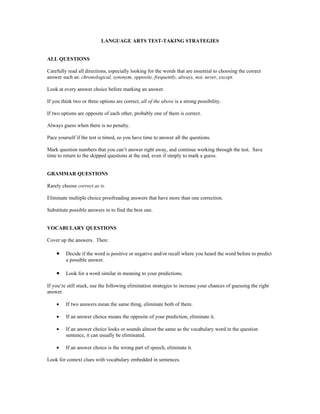
Language test taking strategies
- 1. LANGUAGE ARTS TEST-TAKING STRATEGIES ALL QUESTIONS Carefully read all directions, especially looking for the words that are essential to choosing the correct answer such as: chronological, synonym, opposite, frequently, always, not, never, except. Look at every answer choice before marking an answer. If you think two or three options are correct, all of the above is a strong possibility. If two options are opposite of each other, probably one of them is correct. Always guess when there is no penalty. Pace yourself if the test is timed, so you have time to answer all the questions. Mark question numbers that you can’t answer right away, and continue working through the test. Save time to return to the skipped questions at the end, even if simply to mark a guess. GRAMMAR QUESTIONS Rarely choose correct as is. Eliminate multiple choice proofreading answers that have more than one correction. Substitute possible answers in to find the best one. VOCABULARY QUESTIONS Cover up the answers. Then: • Decide if the word is positive or negative and/or recall where you heard the word before to predict a possible answer. • Look for a word similar in meaning to your predictions. If you’re still stuck, use the following elimination strategies to increase your chances of guessing the right answer. • If two answers mean the same thing, eliminate both of them. • If an answer choice means the opposite of your prediction, eliminate it. • If an answer choice looks or sounds almost the same as the vocabulary word in the question sentence, it can usually be eliminated. • If an answer choice is the wrong part of speech, eliminate it. Look for context clues with vocabulary embedded in sentences.
- 2. READING QUESTIONS Functional writing (like ads, schedules, and lists): • Quickly look at the title, main headings, and any graphics. • Go immediately to the questions. • Refer back to the passage by scanning for key words phrases only if you need to search for a specific detail. • For bibliography questions, remember that the specific order of information in a bibliography entry is: o Author o “Title of article, poem, or chapter” o Title of publication or book o Place of publication o Publisher o Date of publication o Page numbers Paragraph passages: • Check out the title. • Read the first paragraph. • Read the first sentence of every following paragraph. • While reading, pay attention to the 5 W’s (who, where, when, what, why). • Go to the questions. • Refer back to the passage by scanning for key words or phrases only if you need to search for a specific detail. Order of attack: • Answer functional questions or detail questions first. The answers are the easiest to find quickly. • Answer questions that call for higher order thinking, like summarizing and drawing conclusions, last. They require more time and thinking.
- 3. CLASSIC GRAMMATICAL ERRORS Review the following grammar issues that are frequently tested on standardized tests. Don’t worry about memorizing the grammatical terms—the important thing is to recognize an error when you see one! CAPITALIZATION 1. Capitalize first names, last names, countries, and holidays. Tom Anderson shared Chinese food with his friends at the Easter Day Parade. 2. Capitalize a title or profession only if it comes before the person’s name. Tell Principal Williams that the classroom door is broken. 3. Capitalize a region. Do not capitalize a direction. I drove east from North Dakota. 4. Capitalize a location only if it comes right before or after the place’s name. The hospital where I was born was City General Hospital. PUNCTUATION 1. Commas separate items in a list, isolate descriptive phrases, and come before quotations. The truck, barreling down the road, was red, green, and brown. 2. Quotation marks indicate exactly what a person said. Punctuation marks go in front of the quotation marks. Lou said, “I have yet to go to a baseball game this season.” 3. Apostrophes show possession and contractions. They’ll tell you which one is Kathy’s computer. 4. Colons come before items in a list. Semicolons can join separate but related sentences. The movie opens tomorrow; it features the following things: action, drama, and romance. AGREEMENT 1. Subjects must agree with verbs. One of the professors is going to give a lecture next week. 2. Nouns must agree with pronouns.
- 4. If Lucy and Fred decide to come over, they should call us first.
